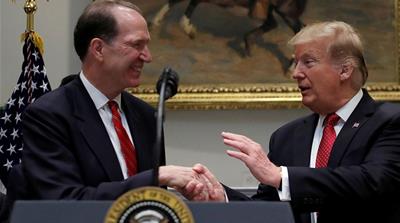
US President Donald Trump said on Wednesday that the World Bank Group should be led by US Treasury official David Malpass, a Trump loyalist and critic of multilateral institutions who has vowed to pursue “pro-growth” reforms at the global lender.
Malpass, the undersecretary for international affairs at the Treasury Department and recently involved in the US-China trade negotiations, has been a sharp critic of the World Bank, especially over its lending to China, who he has said has sufficient resources of its own.
Speaking at the White House on Wednesday, Malpass said he would seek to implement reforms approved last year after negotiations to increase the bank’s lending capital by $13bn, such as curbing loans to and charging higher interest to higher income countries like China.
“I’m very optimistic that we can achieve breakthroughs to create growth abroad that will help us combat extreme poverty and increase economic opportunities in the developing world,” Malpass said. He added that a key goal for the World Bank will be to ensure that women achieve full participation in developing economies.
 |
| US President Donald Trump introduces the US candidate in election for the next President of the World Bank David Malpass at the White House in Washington on February 6, 2019 [Jim Young/Reuters] |
Malpass said he looked forward to working with Trump’s daughter and senior advisor Ivanka on her women’s global development and prosperity initiative.
If his candidacy is approved, Malpass would succeed Jim Yong Kim, who announced in January he is stepping down three years before his term was set to expire amid differences with the Trump administration over climate change and development resources.
The departure of Kim, who was first nominated by former US President Barack Obama in 2012, is likely to become a contentious fight between the Trump administration and other countries who believe the United States exerts too much influence over the bank, which is based in Washington, DC.
Critic of lending to China
Over the past two years, Malpass has pushed for the World Bank to halt lending to China, which he says is too wealthy for such aid, especially when Beijing has subjected some developing countries including Sri Lanka and Pakistan to crushing debt loads with its “Belt and Road” infrastructure development programme. China is the World Bank’s third-largest shareholder after Japan.
At a 2017 forum sponsored by the Council on Foreign Relation, Malpass singled out China as one of the biggest beneficiaries of the World Bank.
“Well, China has plenty of resources,” he said at the time. “And it doesn’t make sense to have money borrowed in the US, using the US government guarantee, going into lending in China for a country that’s got other resources and access to capital markets.”
Asked during the forum if he has discussed his concerns with “Dr Kim’s bank”, he said he was met with “a lot” of resistance. “But we’re having a good dialogue with them,” he said.
As part of the reforms approved last year, he seeks to “graduate” countries to private-sector lending and limit World Bank staff salary growth.
Challengers may emerge
Malpass’s nomination is subject to a vote by the World Bank’s executive board and could draw challengers from some of the bank’s 188 other shareholding countries.
Senior administration officials said Treasury Secretary Steven Mnuchin had already been reaching out to other World Bank shareholders to make the case for Trump’s candidate, and Malpass would travel to meet with officials in many countries to hear what they want from the bank.
The United States, the lender’s largest shareholder with 16 percent of its voting power, has traditionally chosen the bank’s president, but departing president Kim faced challengers from Colombia and Nigeria in 2012.
In recent years, the growing emerging market countries have challenged this unwritten arrangement, demanding a more open, merit-based selection process.
Experts had thought it unlikely those countries would join forces against the US candidate but the choice of Malpass could unite them behind a rival.
Many, including former Treasury officials from both political parties, have sharply criticised Malpass and his qualifications, pointing to his failure to foresee the global financial crisis and opposition, which later proved unjustified, to Federal Reserve policies.
Beginning Thursday, the bank’s board will accept nominations until March 14. It plans to name a new president prior the IMF and World Bank Spring meetings, set for April 12-14 in Washington, DC.












